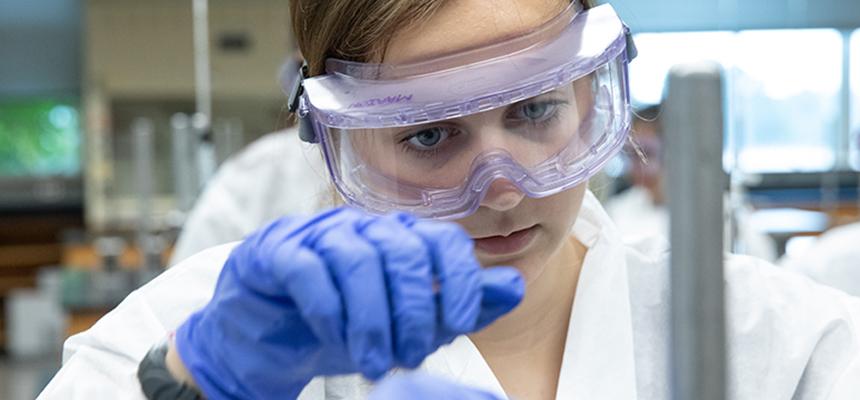
Features of the Chemistry Program
- Research – opportunities to conduct original research with faculty support
- Preparation for Professional Programs – specialized advising offered to prepare for graduate, medical, or veterinary school
- Career Options – pathways designed for your goals (graduate school, dual degree in chemistry and engineering, teaching certification, etc.)
- Professional Development – opportunities to build your resume through internships, professional conferences, and lab assistant positions
- Women in STEM – empowerment and support entering a field in which women are underrepresented
Customize Your Education
At NDMU, our strength is our ability to weave your unique interests into your individual education. Faculty and advisors will help you craft an experience based on your aspirations through minors, accelerated dual-degree programs, or interdisciplinary study.
Double Major or Add a Minor
Many chemistry majors choose to double major or add a minor in mathematics, computer information systems, or physics to prepare for graduate programs in advanced fields of science and engineering.
There are also many opportunities to pair chemistry with another field for interdisciplinary career paths such as technical writing, information science, consulting, or product development.
Dual Degree Engineering Program
Through articulation agreements with premier engineering programs, NDMU offers a pathway to earn a BA in Chemistry from NDMU in 3-4 years followed by a BS in Engineering in 2-3 years from one of the following universities:
- G.W.C. Whiting School of Engineering at The Johns Hopkins University
- Fu Foundation School of Engineering and Applied Science at Columbia University
- McKelvey School of Engineering at Washington University of St. Louis
Engineering programs that can pair with our chemistry program include:
- Chemical Engineering
- Materials Science & Engineering (Columbia or Johns Hopkins only)
- Biomedical Engineering (Columbia or Washington of STL only)
The Dual Degree Engineering Program includes opportunities for chemistry, computer information systems, mathematics, and physics majors. Contact the program coordinator to discuss your interests and goals to determine the most appropriate program for you.
Note: Admission to engineering schools is competitive and is not guaranteed.
Accelerated Path for Pharmacy
If your goal is to earn a Pharm.D. to become a Doctor of Pharmacy, NDMU offers an accelerated program in conjunction with our School of Pharmacy. The program includes three years in the undergraduate studying chemistry or biology followed by four years of graduate school at NDMU. Once complete, you earn both a bachelor’s degree and a Pharm.D.
Pursue a Teaching Career
If your dream is to ultimately become a teacher, NDMU offers two options:
- Your advisor can help you pair the required education courses with your chemistry degree to earn a Secondary Teaching Certification.
- You can pursue the 5-year BA/MAT program to earn a BA in Chemistry and a MA in Teaching.
Both options will prepare you to become certified to teach chemistry in secondary schools (grades 7-12).
Chemistry Minor
The Minor in Chemistry provides an introductory foundation in the study of matter and energy, chemical principles, and lab techniques. Majors that often add a chemistry minor include Biology, Physics, and Computer Science.
Research & Networking
As a chemistry major, you are encouraged to pursue internships, contribute to professional conferences and symposia, attend meetings of the Maryland Section of the American Chemical Society (held on campus and locally), and take part in chemistry department seminars and other events.
Examples of Research Opportunities
- Army Medical Research Institute of Chemical Defense
- University of Maryland School of Pharmacy Department of Pharmaceutical Sciences
- Research Experiences for Undergraduates (REU) sponsored by the National Science Foundation
One of the hallmarks of the rich educational environment at NDMU is the opportunity to participate in research in your field of interest. Our annual Nancy Kreiter Student Research Day provides the perfect forum to showcase your hard work with a formal research presentation to the NDMU community. Chemistry majors also present work at local and national meetings featuring undergraduate research.
Top students are eligible to join the Sr. Alma Science Year fellowship that engages them in hands-on research with scientists at Johns Hopkins School of Medicine.

Victoria Oji
Experience through Campus Organizations
Chemistry Careers
A degree in chemistry can lead to a wide variety of careers in research, pharmaceutical sciences, biotechnology, medicine, engineering, or education.
Examples of chemistry careers include:
- Applied Research & Product Development
- Quality Control
- Environmental Protection
- Forensic Chemistry
- Chemical Engineering
- Technical Sales and Marketing
For more information about careers in chemistry, visit the American Chemical Society.
Graduate Programs
Many graduates of the Chemistry program go on to pursue graduate or professional programs, including:
- Medicine
- Pharmacy
- Dentistry
- Veterinary Medicine
- Engineering
- Education

